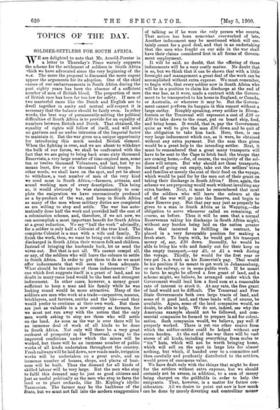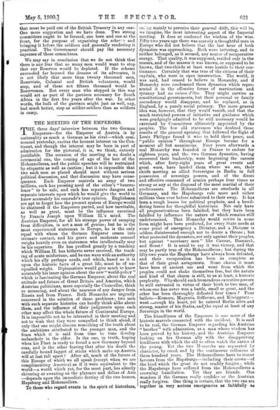TOPICS OF THE DAY.
SOLDIER-SETTLERS FOR SOUTH AFRICA..
WE are delighted to note that Mr. Arnold-Forster in a letter to Thursday's Times warmly supports the scheme for the settlement of soldiers in South Africa vhich we have advocated since the very beginning of the w.r. The more the proposal is discussed the more cogent appear the arguments for its adoption. One of the chief causes of our embarrassments in South Africa during the past eighty years has been the absence of a sufficient number of men of British blood. The proportion of men of British race has been far too low for safety. If men of two masterful razes like the Dutch and English are to dwell together in amity and mutual self-respect it is necessary that the balance should be fairly even. In other words, the beat way of permanently. solving the political difficulties of South Africa is to provide for an equality of numbers between British and Dutch. That obtained, the equality of rights will follow of itself, and will need no garrison and no undue intrusion of the Imperial factor to maintain it. But the war gives us a unique opportunity for introducing this much needed British element. When the fighting is over, and we are about to withdraw the bulk of our forces, we shall be confronted with the fact that we are going to bring back some sixty thousand Reservists, a very large number of time-expired men, some ten or twelve thousand Volunteers, and last, but by no means least, five or six thousand Colonial troops. In other words, we shall have on the spot, and yet be about to withdraw, a vast number of men of the very kind we need most in South Africa,—farmers, artisans, and Hound working men of every description. This being so, it would obviously be wise statesmanship to com- plete the emigration we have unconsciously produced as a by-product of the war, and keep in South Africa as many of the men whose military duties are completed as are willing to stop and settle. The war has auto- matically done half the work and provided half the cost of a colonisation scheme, and, therefore, if we act now, we can accomplish a most important benefit for South Africa at a great reduction. We say "half the work" advisedly, for a soldier is only half a Colonist of the true kind. The complete Colonist is a man with a wife and family. To finish the work, then, we want to bring out to the soldiers discharged in South Africa their women folk and children. Instead of bringing the husbands back, let us send the wives out. But that is not all. We cannot compel all, or any, of the soldiers who will leave the colours to settle in South Africa. In order to get them to do so we must offer inducements that will seem to them adequate. What should be the nature of those inducements ? The one which first suggests itself is a grant of land, and no doubt in many cases land would be the best and. strongest inducement. In other cases, however, a money grant sufficient to keep a man and. his family while he was looking round would be more attractive. Many of the soldiers are men who work at a trade—carpenters, masons, bricklayers, and farriers, smiths and the like—and they would prefer to continue at their own work. But these are just as valuable in a new country as farmers, for we must not run away with the notion that the only men worth asking to stop are those who will settle on the land. As soon as the war is over there will be an immense deal of work of all kinds to be done in South Africa. Not only will there be a very great outburst of prosperity in the Transvaal, owing to the improved conditions under which the mines will be worked, but there will be an immense number of public works of all kinds undertaken throughout the country. Fresh railways will be laid down, new roads made, irrigation works will be undertaken on a great scale, and an immense number of houses, shops, and places of busi- ness will be built. Thus the demand for all kinds of skilled labour will be very large. But the men who stop to fulfil this demand may be just as good citizens and just as useful politically as the men who stop to farm the land or to plant orchards, like Mr. Kipling's idyllic Tasmanian. The farmer may be the backbone of the State, but we must not fall into the modern exaggeration of talking as if be were the only person who counts. That notion has been somewhat overworked of late. Another inducement may be mentioned which will cer- tainly count for a good deal, and that is an undertaking that the men who fought on our side in the war shall have their claims considered first in all forms of Govern- ment employment. It will be said, no doubt, that the offering of these inducements will be a very costly matter. No doubt that is so, but we think that it can be shown that with a little foresight and management a great deal of the work can be accomplished without extra expense. We must remember, to begin with, that every soldier now in South Africa who will be in a position to claim his discharge at the end of the war has, as it were, made a contract with the Govern- ment to be transported to his home in England, or Canada, or Australia, or wherever it may be. But the Govern- ment cannot p3rform its bargain in this respect without a large outlay. Roughly speaking, every soldier in Bloem- fontein or the Transvaal will represent a cost of £20 or .230 to take down to the coast, put on board ship, feed, and bring home. It would, that is, pay the Government quite as well to give the man £30 down and be quit of the obligation to take him back. Here, then, is one very large inducement which can, as it were, be obtained without any extra payment. But the sum thus given would be a great help to the intending settler. Next, it must be remembered that a great many transports will have to be sent to the Cape to fetch back the troops that are coming home,—for, of course, the majority of the sol- diers will return. But why should not these transports, instead of going out empty, take out the sealers' wives and families at merely the cost of their food on the voyage, which would be paid for by the men out of their grant on taking their discharge in South Africa? Here, again, the scheme we are proposing would work without involving any extra burden. Next, it must be remembered that most of the soldiers who will leave the colours at the end of the war will go into the Reserve, and begin to draw Reserve pay. But that pay may just as properly be given to a man in South Africa as in Wapping,—the obligation to serve whenever called on remaining, of course, as before. Thus it will be seen that a normal Reserveman taking his discharge in South Africa might, without any burden being laid on the nation greater than that incurred in fulfilling its contract, be placed in a very favourable- position for making a fresh start. To begin with, he would get his transport money of, say, £30 down. Secondly, he would be able to bring his wife and family out for their keep on the empty transport,—say .23, or £1 a week during the voyage. Thirdly, he would for the first year or two get 78. a week as his Reservist's pay. That would be his position if he meant to get work in Johannesburg, or on the railway, or in some public work. If he meant to farm he might be offered a free grant of land, and a scheme might, we believe, be arranged under which the Government would lend. him a fixed sum at a reasonable rate of interest to stock it. At any rate, the free grant of land would not be difficult. The Transvaal and Free State Governments both own large tracts of land, and some of it good land, and these lands will, of course, be available. Again, some of the land companies would, no doubt, be able to help. We do not, indeed, see why the American example should not be followed, and com- mercial companies be formed to prepare land for coloni- sation. Such companies would, we believe, pay well if properly worked. There is yet one other source from which the soldier-settler could be helped without any extra burden. At the end of the war there will be vast stores of all kinds, including everything from mules to " tin " huts, which will not be worth bringing home, which will sell on the spot in large lots for almost nothing, but which, if handed over to a committee and then carefully and prudently distributed to the settlers, would prove of enormous value.
We have dealt only with the things that might be done for the settlers without extra expense, but we should certainly not be averse, in addition, to a sum of money being charged on the goldfields in order to help the emigrants. That, however, is a matter for future con- sideration. All we desire to point out now is how much can be done by merely diverting and oontrolline money that must be paid out of the British Treasury in any case. One more suggestion and we have done. Two strong committees ought to be formed, one here and one at the front, for the purpose of organising the schero and bringing it before the soldiers and generally rendering it practical. The Government should pay the necessary expenses of those committees.
We may say in conclusion that we do not think that there is any fear that so many men would want to stop that our Reserves would be depleted. If the scheme succeeded far beyond the dreams of its advocates, it is not likely that more than twenty thousand men, Reservists, Colonial and British volunteers, would stop, and of these not fifteen thousand would be Reseivemen. But every man who stopped in this way would act as part of the garrison necessary for South Africa, in the first five years after the war. In other words, the bulk of the garrison might just as well, nay, had much better, stop as soldier-settlers than as soldiers in camp.







































 Previous page
Previous page